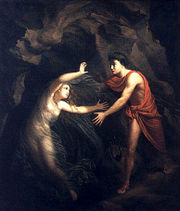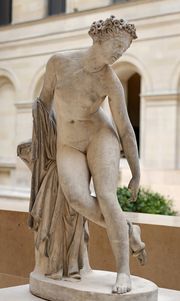Eurydice


Eurydice (Εὐρυδίκη, Eurydíkē) (yur-ID-ih-see) in Greek mythology, was an oak nymph or one of the daughters of Apollo (the god of light). She was the wife of Orpheus, who loved her dearly; on their wedding day, he played joyful songs as his bride danced through the meadow. One day, a satyr saw and pursued Eurydice, who stepped on a venomous snake, dying instantly. Distraught, Orpheus played and sang so mournfully that all the nymphs and gods wept and told him to travel to the Underworld and retrieve her, which he gladly did. After his music softened the hearts of Hades and Persephone, his singing so sweet that even the Erinyes wept, he was allowed to take her back to the world of the living. In another version, Orpheus played his lyre to put Cerberus, the guardian of Hades, to sleep, after which Eurydice was allowed to return with Orpheus to the world of the living. Either way, the condition was attached that he must walk in front of her and not look back until both had reached the upper world. However, just as they reached the portals of Hades and daylight, he could not help but turn around to gaze on her face, and Eurydice vanished again from his sight, this time forever.
The story in this form belongs to the time of Virgil, who first introduces the name of Aristaeus and the tragic outcome.[1] Other ancient writers, however, speak of Orpheus' visit to the underworld in a more negative light; according to Phaedrus in Plato's Symposium,[2] the infernal gods only "presented an apparition" of Eurydice to him. Ovid says that Eurydice's death was not caused by fleeing from Aristaeus but by dancing with naiads on her wedding day. In fact, Plato's representation of Orpheus is that of a coward; instead of choosing to die in order to be with the one he loved, he instead mocked the gods by trying to go to Hades and get her back alive. Since his love was not "true" — meaning he was not willing to die for it — he was actually punished by the gods, first by giving him only the apparition of his former wife in the underworld, and then by being killed by women.
The story of Eurydice may actually be a late addition to the Orpheus myths. In particular, the name Eurudike ("she whose justice extends widely") recalls cult-titles attached to Persephone. The myth may have been derived from another Orpheus legend in which he travels to Tartarus and charms the goddess Hecate.[3]
The story of Eurydice has strong parallels to the Japanese myth of Izanami, as well as to the Mayan myth of Itzamna and Ix Chel, the Indian myth of Savitri and Satyavan, the Akkadian/Sumerian myth of Inanna's descent to the underworld, and the Biblical story of Lot and his wife.
Contents |
Works of art
The story of Orpheus and Eurydice has been depicted in a number of works by famous artists, including Titian, Peter Paul Rubens, Nicolas Poussin and recently Bracha Ettinger whose series Eurydice was exhibited in the Pompidou Centre, Paris (Face à l'Histoire, 1996); the Stedelijk Museum, Amsterdam (Kabinet, 1997) and The Royal Museum of Fine Arts, Antwerpen (Gorge(l), 2007) and has inspired ample writings in the fields of ethics, aesthetics, art and feminist theory. It has also been retold in an opera by Monteverdi, Jacopo Peri, C W Gluck, Yevstigney Fomin and Harrison Birtwistle, a play by Sarah Ruhl, and in the comic book The Sandman by Neil Gaiman. It also forms the basis for the 1967 song "From the Underworld" by The Herd, and the poem "The Years Go Fast and the Days Go Slow" by James McCoy. "Eurydice (don't follow)" is also a song by the band The Cruxshadows. The music project Sleepthief includes a song called "Eurydice" on their first album, The Dawnseeker. The myth of Orpheus and Eurydice features prominently in the 1967 album Reflections by Manos Hadjidakis, the Nick Cave and the Bad Seeds album The Lyre of Orpheus, and The New York Rock and Roll Ensemble song "Orpheus". The band She & Him has a song entitled Don't Look Back, which references the story. The myth inspired the 1959 film Black Orpheus (Portuguese: Orfeu Negro) made in Brazil by French director Marcel Camus. It won the Golden Palm at the 1959 Cannes Film Festival. The myth also is the basis for Anais Mitchell's folk opera Hadestown, created in collaboration with composer Michael Chorney and director Ben T. Matchstick. The freeware game Don't Look Back is a modern interpretation of the story.
See also
- List of characters in Metamorphoses
- Valsa de Euridice, a song by Vinicius de Moraes
- Euridice, an opera by Jacopo Peri
- Orphée, directed by Jean Cocteau (1949)
- Orfeo ed Euridice, an opera by Christoph Willibald Gluck
- Eurydice, a play by Sarah Ruhl
- Orfeu Negro, a 1959 adaptation of the classic myth, filmed in Brazil
- L'Orfeo, the earliest extant opera, from 1607, by Monteverdi
- The Lyre of Orpheus (album), an album by Nick Cave and the Bad Seeds
- Orpheus, a song by Manos Hadjidakis and The New York Rock and Roll Ensemble
- Eurydice, a play by Jean Anouilh
- Euridice, a song from the album Moving Waves by Focus
- Eurydice, a song from the album Echoes and Artifacts by The Crüxshadows
- The Eurydice Project, written by D.J. Whistler (2007)
- Hadestown, an 2010 ensemble album by Anais Mitchell, featuring Mitchell as Eurydice, Justin Vernon as Orpheus and Ani DiFranco among others, retelling the myth as a 'folk opera' in Depression era America
References
- ↑ M. Owen Lee, Virgil as Orpheus: A Study of the Georgics, State University of New York Press, Albany (1996), p. 9.
- ↑ Symposium 179d.
- ↑ Robert Graves, The Greek Myths, Penguin Books Ltd., London (1955), Volume 1, Chapter 28, "Orpheus", p. 115.
Sources
- Ovid, Metamorphoses 10
- Apollodorus, The Library 1.3.2
- Pausanias, Description of Greece 9.30
- Virgil, Georgics 4.453
- Plato, Symposium
- Sleepthief,"Eurydice" featuring Jody Quine"
- Griselda Pollock, "Abandoned at the Mouth of Hell". In: Looking Back to the Future. G&B Arts. ISBN 90-5701-132-8.
- Judith Butler, "Bracha's Eurydice". In: Bracha Lichtenberg Ettinger: Eurydice Series. Edited by Catherine de Zegher and Brian Massumi. Drawing Papers n.24. The Drawing center, NY, 2001. Reprinted in: Theory, Culture and Society, 21(1), 2004. ISSN 0263-2764.
- Emmanuel Levinas in conversation with Bracha L. Ettinger, "What would Eurydice Say?" (1991-1993). Reprinted in 1997. Reprinted in Athena: Philosophical Studies, Volume 2, 2006. ISSN 1822-5047.
- Dorota Glowaka, "Lyotard and Eurydice". In: Margaret Grebowicz (ed.),Gender after Lyotard. NY: Suny Press, 2007. ISBN 978-0-7914-6956-9
- Christine Buci-Glucksmann, "Eurydice and her Doubles. Painting after Auschwitz", in: Artworking 1985-1999, Amsterdam: Ludion, 2000. ISBN 90-5544-283-6.
- Carol Ann Duffy, "Eurydice". In: The World's Wife. ISBN 9780330372220.